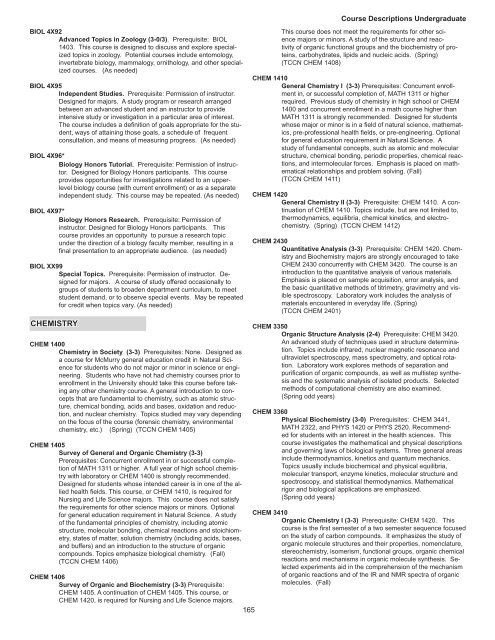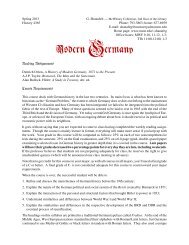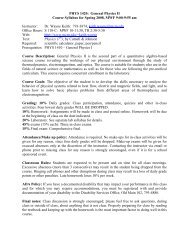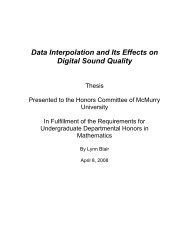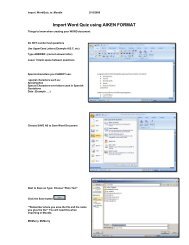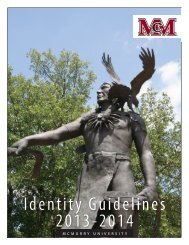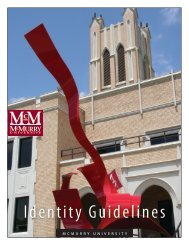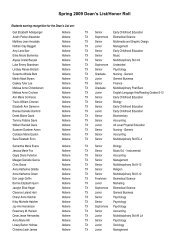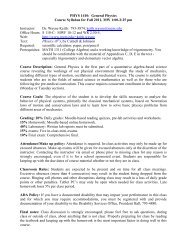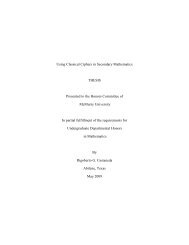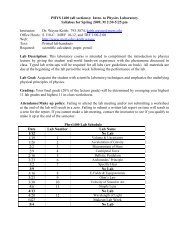Catalog 12-13.indd - McMurry University
Catalog 12-13.indd - McMurry University
Catalog 12-13.indd - McMurry University
Create successful ePaper yourself
Turn your PDF publications into a flip-book with our unique Google optimized e-Paper software.
BIOL 4X92Advanced Topics in Zoology (3-0/3). Prerequisite: BIOL1403. This course is designed to discuss and explore specializedtopics in zoology. Potential courses include entomology,invertebrate biology, mammalogy, ornithology, and other specializedcourses. (As needed)BIOL 4X95Independent Studies. Prerequisite: Permission of instructor.Designed for majors. A study program or research arrangedbetween an advanced student and an instructor to provideintensive study or investigation in a particular area of interest.The course includes a defi nition of goals appropriate for the student,ways of attaining those goals, a schedule of frequentconsultation, and means of measuring progress. (As needed)BIOL 4X96*Biology Honors Tutorial. Prerequisite: Permission of instructor.Designed for Biology Honors participants. This courseprovides opportunities for investigations related to an upperlevelbiology course (with current enrollment) or as a separateindependent study. This course may be repeated. (As needed)BIOL 4X97*Biology Honors Research. Prerequisite: Permission ofinstructor. Designed for Biology Honors participants. Thiscourse provides an opportunity to pursue a research topicunder the direction of a biology faculty member, resulting in afi nal presentation to an appropriate audience. (as needed)BIOL XX99Special Topics. Prerequisite: Permission of instructor. Designedfor majors. A course of study offered occasionally togroups of students to broaden department curriculum, to meetstudent demand, or to observe special events. May be repeatedfor credit when topics vary. (As needed)CHEMISTRYCHEM 1400Chemistry in Society (3-3) Prerequisites: None. Designed asa course for <strong>McMurry</strong> general education credit in Natural Sciencefor students who do not major or minor in science or engineering.Students who have not had chemistry courses prior toenrollment in the <strong>University</strong> should take this course before takingany other chemistry course. A general introduction to conceptsthat are fundamental to chemistry, such as atomic structure,chemical bonding, acids and bases, oxidation and reduction,and nuclear chemistry. Topics studied may vary dependingon the focus of the course (forensic chemistry, environmentalchemistry, etc.) (Spring) (TCCN CHEM 1405)CHEM 1405Survey of General and Organic Chemistry (3-3)Prerequisites: Concurrent enrollment in or successful completionof MATH 1311 or higher. A full year of high school chemistrywith laboratory or CHEM 1400 is strongly recommended.Designed for students whose intended career is in one of the alliedhealth fi elds. This course, or CHEM 1410, is required forNursing and Life Science majors. This course does not satisfythe requirements for other science majors or minors. Optionalfor general education requirement in Natural Science. A studyof the fundamental principles of chemistry, including atomicstructure, molecular bonding, chemical reactions and stoichiometry,states of matter, solution chemistry (including acids, bases,and buffers) and an introduction to the structure of organiccompounds. Topics emphasize biological chemistry. (Fall)(TCCN CHEM 1406)CHEM 1406Survey of Organic and Biochemistry (3-3) Prerequisite:CHEM 1405. A continuation of CHEM 1405. This course, orCHEM 1420, is required for Nursing and Life Science majors.165Course Descriptions UndergraduateThis course does not meet the requirements for other sciencemajors or minors. A study of the structure and reactivityof organic functional groups and the biochemistry of proteins,carbohydrates, lipids and nucleic acids. (Spring)(TCCN CHEM 1408)CHEM 1410General Chemistry I (3-3) Prerequisites: Concurrent enrollmentin, or successful completion of, MATH 1311 or higherrequired. Previous study of chemistry in high school or CHEM1400 and concurrent enrollment in a math course higher thanMATH 1311 is strongly recommended. Designed for studentswhose major or minor is in a fi eld of natural science, mathematics,pre-professional health fi elds, or pre-engineering. Optionalfor general education requirement in Natural Science. Astudy of fundamental concepts, such as atomic and molecularstructure, chemical bonding, periodic properties, chemical reactions,and intermolecular forces. Emphasis is placed on mathematicalrelationships and problem solving. (Fall)(TCCN CHEM 1411)CHEM 1420General Chemistry II (3-3) Prerequisite: CHEM 1410. A continuationof CHEM 1410. Topics include, but are not limited to,thermodynamics, equilibria, chemical kinetics, and electrochemistry.(Spring) (TCCN CHEM 14<strong>12</strong>)CHEM 2430Quantitative Analysis (3-3) Prerequisite: CHEM 1420. Chemistryand Biochemistry majors are strongly encouraged to takeCHEM 2430 concurrently with CHEM 3420. The course is anintroduction to the quantitative analysis of various materials.Emphasis is placed on sample acquisition, error analysis, andthe basic quantitative methods of titrimetry, gravimetry and visiblespectroscopy. Laboratory work includes the analysis ofmaterials encountered in everyday life. (Spring)(TCCN CHEM 2401)CHEM 3350Organic Structure Analysis (2-4) Prerequisite: CHEM 3420.An advanced study of techniques used in structure determination.Topics include infrared, nuclear magnetic resonance andultraviolet spectroscopy, mass spectrometry, and optical rotation.Laboratory work explores methods of separation andpurifi cation of organic compounds, as well as multistep synthesisand the systematic analysis of isolated products. Selectedmethods of computational chemistry are also examined.(Spring odd years)CHEM 3360Physical Biochemistry (3-0) Prerequisites: CHEM 3441,MATH 2322, and PHYS 1420 or PHYS 2520. Recommendedfor students with an interest in the health sciences. Thiscourse investigates the mathematical and physical descriptionsand governing laws of biological systems. Three general areasinclude thermodynamics, kinetics and quantum mechanics.Topics usually include biochemical and physical equilibria,molecular transport, enzyme kinetics, molecular structure andspectroscopy, and statistical thermodynamics. Mathematicalrigor and biological applications are emphasized.(Spring odd years)CHEM 3410Organic Chemistry I (3-3) Prerequisite: CHEM 1420. Thiscourse is the fi rst semester of a two semester sequence focusedon the study of carbon compounds. It emphasizes the study oforganic molecule structures and their properties, nomenclature,stereochemistry, isomerism, functional groups, organic chemicalreactions and mechanisms in organic molecule synthesis. Selectedexperiments aid in the comprehension of the mechanismof organic reactions and of the IR and NMR spectra of organicmolecules. (Fall)


